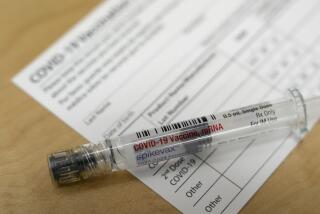For Patients, a Frustrating Delay
While more women than ever seek annual mammograms on the advice of their doctors, breast imaging centers across the country are scaling back or shutting down operations, saying that they are losing money on the exams.
In the meantime, the crunch between growing demand for mammograms and the shrinking supply of locations where the tests can be performed is resulting in long delays for patients seeking appointments. In Los Angeles, women have waited up to four weeks for an appointment at UCLA’s breast imaging center, hospital officials said. In Pittsburgh, imaging centers have appointment backlogs of up to eight weeks, officials said. And patients at the Sally Jobe Breast Center near Denver have waited two weeks for a follow-up scan after initial mammograms have found a suspicious area.
“Diagnosing breast cancer early is a national priority,” says Robert A. Smith, director of cancer screening for the American Cancer Society in Atlanta. “Yet the government and insurers have restricted reimbursement, which undermines our ability to offer breast imaging.”
The question that many hospital and imaging centers now face is how long they can absorb these losses before they’ll be forced to shut down. And women in poorer communities, where imaging centers are awash in red ink, could be forced to travel great distances to get mammograms if local facilities close.
In fact, one highly regarded clinic in New York--the NYU-Zuckerman Breast Imaging Center--has closed, while the economically strapped UCLA Medical Center discontinued its mobile mammography program because it couldn’t afford to replace the truck. And other facilities may soon cut back on services, which will increase patient load at the centers that remain open.
Still, most doctors and clinics will test a woman with a lump or an abnormal mammogram as soon as possible. But even delays of a few days can seem like an eternity to a woman who’s worried she has cancer.
The real danger of these logjams, says Dr. Stephen A. Feig, a radiology professor at Mount Sinai School of Medicine in New York, is that women frustrated by long waits may decide to forgo an exam. “As a result, we’ll miss cancer we otherwise would have detected. Or we may not catch cancers early enough because of the waits.”
Some believe the financial crunch will worsen because insurance and Medicare reimbursements for mammograms have remained flat in the last five years, while the costs associated with such tests have risen. As screening techniques have become more sophisticated, for example, radiologists have had to devote more time to the exams. Also, new FDA regulations that mandate stricter quality standards have increased paperwork, adding $6 to $8 per screening, according to figures compiled by Dr. Ellen B. Mendelson, director of the breast imaging center at the Western Pennsylvania Hospital in Pittsburgh.
Across the country, breast imaging costs, which include the cost of materials and the radiologist’s time, range from $36 to $87. Yet Medicare’s reimbursement is about $46 to $68 for the scan and $21.70 for the radiologist. Health insurers generally reimburse doctors and clinics anywhere from $36 to $80.
“We’re considered a loss leader in our department,” says Dr. Lawrence W. Bassett, director of the Iris Cantor Center for Breast Imaging at UCLA Medical Center.
Mendelson says her Pittsburgh imaging center, which performs about 12,000 mammograms annually, is “losing $30 a scan” for certain patients. “Over a year that translates into thousands of dollars,” she adds.
The American College of Radiology has appointed a task force to attempt to address the problem of reimbursement for mammograms. Meanwhile, however, medical experts say the delays are likely to continue, and they advise women to schedule their mammograms well ahead of time.
More to Read
Sign up for Essential California
The most important California stories and recommendations in your inbox every morning.
You may occasionally receive promotional content from the Los Angeles Times.










